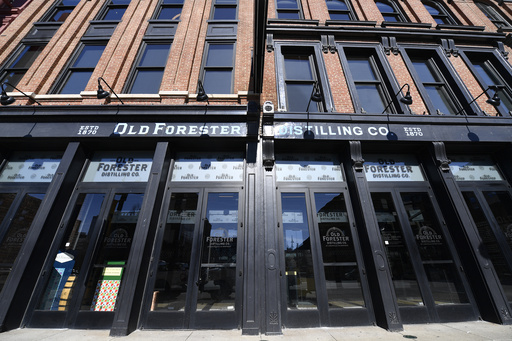LAWRENCEBURG, Ky. — In the picturesque rolling hills of Kentucky, a new trade dispute looms over the bourbon industry, leaving producers with a sense of impending dread reminiscent of a bad hangover. As President Donald Trump hinted at fresh tariffs on U.S. neighbors Canada and Mexico, bourbon makers find themselves once again in the spotlight. However, a recent agreement between Trump and Mexican President Claudia Sheinbaum has paused the tariffs for a month to allow for further talks.
The exportation of American whiskey saw a significant decline during a previous trade conflict in Trump’s initial term. Canada, a crucial market for U.S. spirits, responded promptly to the latest tensions by imposing tariffs on American imports, including various beverages, effective Tuesday. Several Canadian provinces, such as Ontario, British Columbia, Quebec, Manitoba, and Nova Scotia, are also set to remove American liquor brands from state-controlled store shelves.
This cyclical trade warfare presents a worrying scenario for Kentucky’s bourbon industry and its advocates. A recently released study revealed that the bourbon sector contributes $9 billion annually to the Kentucky economy, fostering job creation and drawing increasing numbers of tourists. According to the Kentucky Distillers’ Association, distillers in the state produce an astounding 95% of the global bourbon output.
Bourbon production is integral to the economic fabric of Lawrenceburg, home to famous distilleries such as Wild Turkey and Four Roses. The town’s streets are decorated with old bourbon barrels repurposed as planters, enhancing its distinctive charm. Kentucky’s Democratic Governor, Andy Beshear, has cautioned that tariffs could negatively affect families, particularly in a state that strongly supported Trump’s reelection campaign. He emphasized that the repercussions would extend beyond the distilleries to impact farmers, workers in bottling facilities, and cooperages, which craft the barrels.
Beshear made a passionate plea via social media, reminding the public of the local community’s reliance on the bourbon industry. “We must consider the farmers backing this industry and the hardworking individuals in bottling plants and cooperages. Our stakeholders are our families and neighbors,” he asserted.
Meanwhile, Republican U.S. Representative Andy Barr, representing a district at the core of Kentucky’s bourbon production, expressed his support for Trump amid the uncertainty. Barr stated, “Other countries have underestimated the U.S. as a global power, and under Trump’s leadership, they will soon realize we will no longer be exploited.” He pledged to defend the bourbon sector, labeling it a critical driver of jobs and economic vitality.
Republican U.S. Senator Mitch McConnell shared his concerns about potential job losses and increasing consumer prices due to tariffs. “While I support countering unfair trading practices and leveling the field for American manufacturers, tariffs are not my preference. They ultimately raise prices on goods and services, burdening consumers,” he remarked.
The bourbon industry continues to hope for a more favorable resolution. Chris Swonger, president and CEO of the Distilled Spirits Council of the United States, urged both the U.S. and Canada to negotiate terms that would allow their respective spirits industries to flourish. Many distillers find themselves cornered by these new tariffs, Swonger remarked.
Certain spirits are classified as “distinctive products” by the U.S. and Canada, meaning they are exclusive to their respective nations—examples being bourbon and Tennessee Whiskey in the U.S. and Canadian Whisky in Canada. This classification restricts the relocation of production to different countries or regions.
Prior to this recent trade friction, American whiskey makers were already facing challenges, particularly with large stocks of whiskey maturing and waiting to hit the market. The Kentucky Distillers’ Association noted that a record 14.3 million barrels of bourbon are currently aging, yet fewer young adults appear interested in alcohol consumption.
Potentially exacerbating the situation is the looming threat from the European Union, which could reinstate a staggering 50% tariff on American whiskey by late March if proactive measures are not taken. Trump indicated that import taxes are “definitely in the works” for the EU and potentially the UK as well. The reintroduction of tariffs in the key export market for American whiskey would have dire consequences, as echoed by Swonger.




